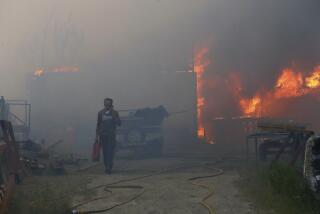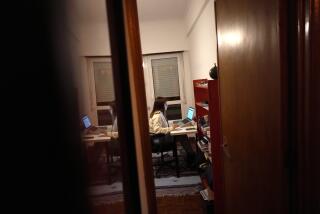Blast at Anything That Moves : No Property Off Limits to Portuguese Hunters
- Share via
CRATO, Portugal — On Thursdays and Sundays, the peace of rural Portugal is shattered by gunfire as 350,000 licensed hunters take to the fields to blast away at rabbit, partridge and just about anything else that moves.
Swathed in cartridge belts, with dogs yapping at his heels, the Portuguese hunter may go and shoot where he pleases.
“It’s a crazy situation when someone can go freely onto private property if he has a gun but is trespassing if he hasn’t,” said Joao Bugalho, head of the government-run hunting service.
Popular hunting rights date back to the overthrow of the monarchy in 1910. Though farmers and conservationists complain about damage to property and wildlife, the hunting lobby is too strong for major changes to be made.
The plains of the Alentejo region of southern Portugal are the traditional hunting grounds, used by all social classes from the rich Lisbon businessman to the poor local farm worker.
Portuguese Macho
Fathers take even very young sons with them on hunting expeditions, and one of the first possessions an 18-year-old Alentejo male aspires to is a shotgun. Women are not involved--except as cooks if their menfolk return with game.
“Hunting is not as good as it used to be. Every year there seems to be less game,” said Alfredo Mesquita, a shop owner from the small town of Crato in the Alentejo. Since the season opened at the end of October, he had managed to kill only half a dozen rabbits and a few woodcock. The partridge had eluded him.
According to Bugalho, the hunters do not realize that by insisting on their rights and resisting greater control of hunting--with reserves to breed game--they put their pastime at risk.
“They must be educated in the idea that hunting can no longer be what it was at the turn of the century. Game needs constant nurturing or it will die out,” he said.
In recent years he has made some progress in creating a few reserves in public land, but is hampered by lack of staff. The service has only 500 full-time “hunting guards,” most of them over 50, who act as game keepers and hunting police.
“There is no one to enforce the law. No one respects it and most hunters don’t know what they should and shouldn’t shoot. They end up killing everything,” said Margarida Borges de Carvalho, a member of Parliament.
Portuguese law stipulates which animals and birds may be hunted by specified methods on certain days during a limited season in the autumn and winter.
“No one takes any notice--everything that flies they kill. Birds of prey, like the falcon, are becoming rarer and rarer,” Borges de Carvalho said.
Even so, conventional hunting is not the conservationists’ main worry. Many Portuguese, in southern European tradition, delight in illegally trapping, catching and snaring birds of all kinds, in all manners.
Cruel Traps Used
Birds are ensnared in nets, caught on glue-covered perches, crushed in spring traps or felled by air guns. Some are eaten as snacks, others sold as quail. Many are simply killed for the “fun” of it.
About 1,000 people are prosecuted every year for illegal hunting or trapping. There is a maximum jail sentence of six months, but most are fined, have licenses revoked or firearms confiscated, depending on the judge.
Some progress toward controlling indiscriminate slaughter has been made with the introduction from next season of an exam for all new hunters. Up to now, anyone could obtain a license simply by applying and paying $12.
Hunters will be tested on identification of species, hunting law, care of dogs and use of firearms, Bugalho said. “Many hunting dogs are badly treated in Portugal . . . and many hunters do not know how to use a shotgun properly.”
On the opening day of the hunting season this year, in the district of Evora in central Alentejo alone, 30 people were taken to hospital after hunting accidents.
More to Read
Sign up for Essential California
The most important California stories and recommendations in your inbox every morning.
You may occasionally receive promotional content from the Los Angeles Times.










